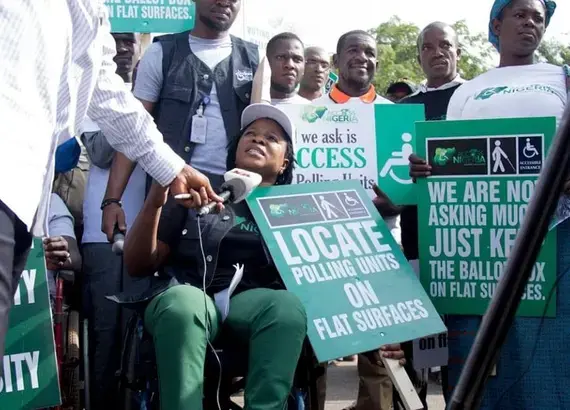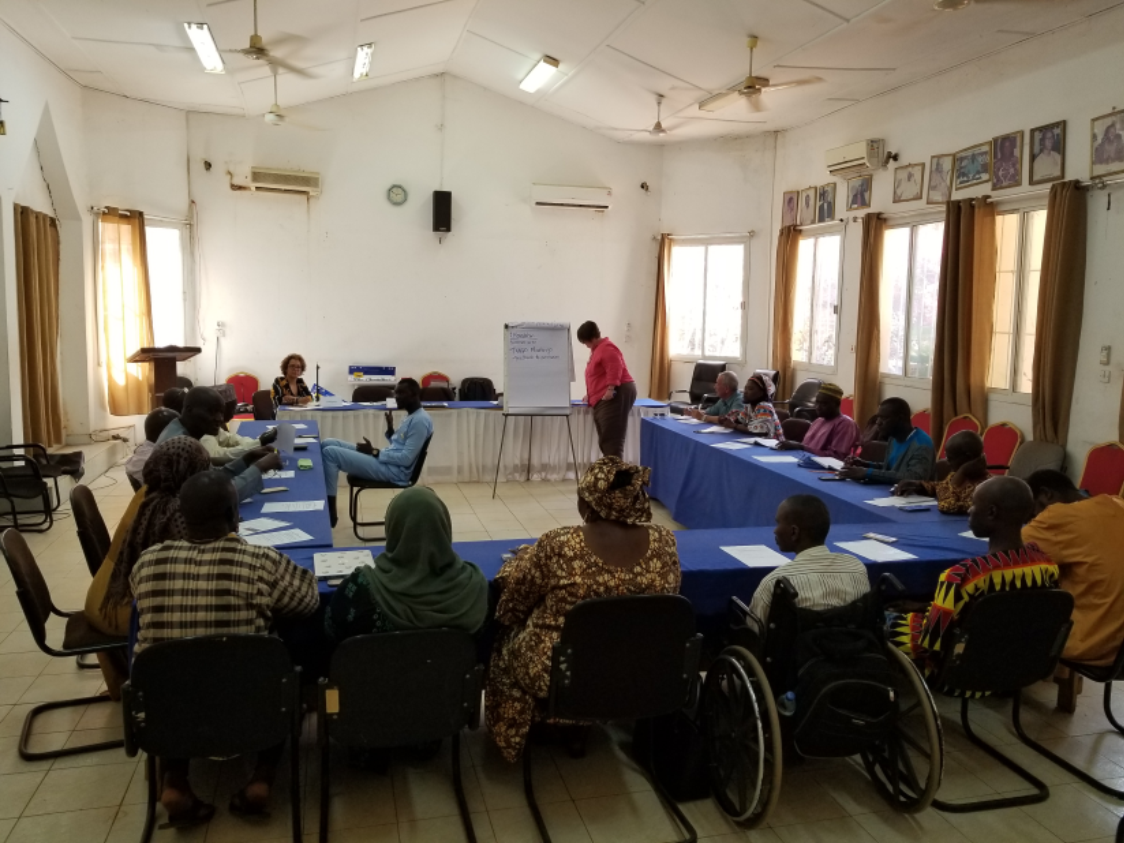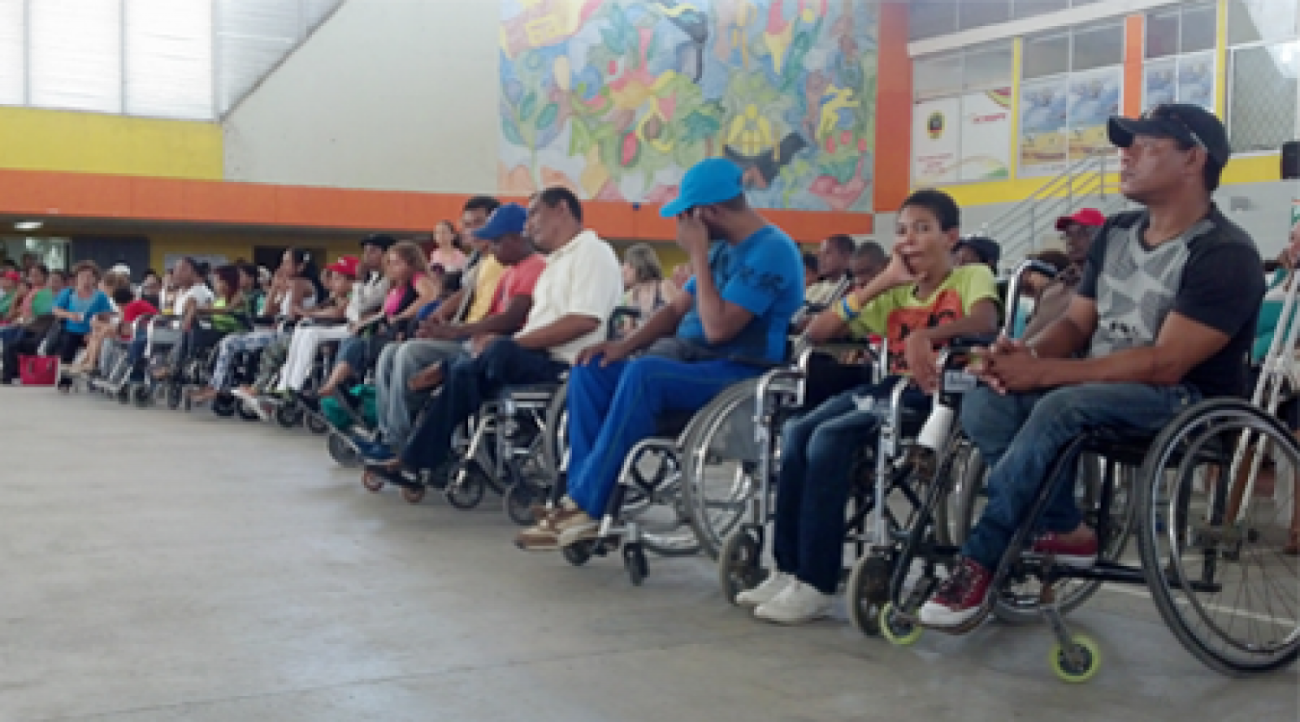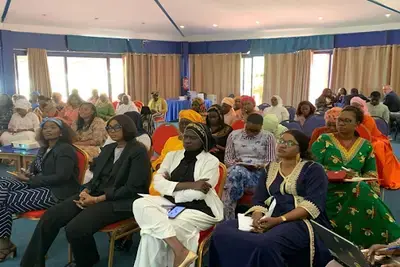
Grace Jerry, executive director of Nigeria’s Inclusive Friends Association, answers a journalist’s questions during a rally to call for greater efforts to ensure the inclusion of persons with disabilities in elections.
Success Story
How NDI Supports the Political Inclusion of Persons with Disabilities
The World Health Organization estimates 15 to 20 percent of the world’s population (approximately one billion people) as having a disability. Persons with disabilities are the world’s largest minority group and more than 80 percent of the world’s persons with disabilities live in developing and post-conflict countries. The disability community remains largely excluded from public life and is underrepresented in parliaments and political parties, limiting their ability to directly engage in decisions that impact their lives. But through purposeful engagement, this community can challenge barriers that limit their ability to exercise their full rights and responsibilities on an equal basis with others.
Globally, the disability community is seeing remarkable progress but there is still much more to be done. The 2006 adoption of the United Nations Convention on the Rights of Persons with Disabilities was the first international treaty setting standards to promote, protect, and ensure the full and equal enjoyment of human rights and fundamental freedoms by all persons with disabilities. Through collective efforts of disabled persons organizations at all levels, governments, international organizations, and donors, the movement has begun to change the narrative from persons with disabilities as objects of charity to active, engaged members of society.

On December 3, the world will recognize the International Day of Persons with Disabilities, a day to promote the rights and well-being of persons with disabilities in all spheres of society including public and political life. NDI has worked with the disability community for over 25 years, supporting disabled persons organizations around the world to lead efforts in changing cultural expectations for their inclusion and advocate for disability rights through political engagement (click here to read more about NDI’s approach to disability inclusion).
Inclusive Friends Association is making significant strides toward a more inclusive society for persons with disabilities in Nigeria. With NDI support, the organization implemented Nigeria’s first-ever disability-led polling unit accessibility audits to better understand the barriers persons with disabilities face when going to the polls. This effort and subsequent advocacy led to a public commitment from the chairman of Nigeria’s election management body to support accessibility reforms and reaffirmed disability rights as fundamental to Nigeria’s democracy. In 2018, Nigeria’s election management body introduced a Braille ballot guide that allowed voters who are blind or low vision cast their ballots independently and confidentially for the first time in the country’s history. Over the course of the three-year partnership with NDI, Inclusive Friends Association has grown into a nationally recognized organization and a commanding voice on disability rights in Nigeria.
A twenty-year authoritarian regime ended when The Gambia successfully held democratic elections in 2016. Following the transition, NDI convened members of The Gambia Federation of the Disabled to press the Constitutional Review Commission for a disability-inclusive constitution. Together with fourteen other disabled persons organizations, The Gambia Federation of the Disabled developed and submitted a set of common concerns to the commission. Since the initial workshop with NDI, the Federation has continued to work with the commission and engage in other political processes, such as inclusive elections and moving forward a disability rights bill, ensuring the needs of persons with disabilities continue to be heard and addressed.

While empowering disabled person organizations to advocate for their rights is an important element of NDI’s work, the Institute understands that it takes more than just advocacy to implement change. In Colombia, where the legal framework for accessibility is already quite robust, disabled persons organizations, with NDI support, are working to improve compliance with existing protections. For instance, the electoral council now requires political parties to include sign language at public events and in their publicity. NDI is working alongside disabled persons organizations to develop a database of sign language interpreters to make it easier for political parties to hire qualified interpreters and comply with the new requirements meant to guarantee the right to accessible information for citizens who are deaf or hard of hearing.
NDI’s programs focus on a wide variety of areas such as identifying barriers to political participation, ensuring accessibility at the polls, improving disability safety and accessibility to public transportation and government office buildings, and increasing the rights of persons with disabilities to vote and hold elected office. All of these efforts result in democracies that are inclusive, more likely to endure and meet the needs of all segments of society.



